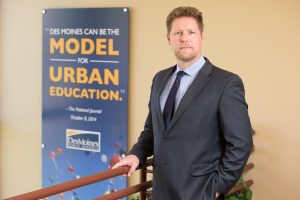This month marks the 50th anniversary of the landmark Tinker v. Des Moines Independent Community School District decision by the U.S. Supreme Court, guaranteeing the free speech rights of students. Even though DMPS was on the losing side of this case a half century ago, Superintendent Tom Ahart writes about why the Tinker case is more relevant than ever, and how today is is a key part of the culture at DMPS. Below is a reprint of Dr. Ahart’s guest editorial that appeared in the Des Moines Register.
A student locker at Harding Middle School on Des Moines’ North side was dedicated in 2013 as a tribute to a former student who led a cause that resulted in students around the country no longer checking their freedom of speech at the schoolhouse gate.
Mary Beth Tinker is that former student. Along with her brother and a friend, her silent protest of the Vietnam War led to a landmark U.S. Supreme Court decision. In Tinker v. Des Moines, the court ruled that students do not “shed their constitutional rights to freedom of speech or expression” so long as they do not disrupt the educational process.
The Des Moines Independent Community School District was the losing party in that case. It might seem odd that the losing party in a legal case would celebrate the outcome, but the lesson learned is now a foundation of the district’s culture. Today, educating students who will go on to be engaged and informed citizens is at the core of our work.
In fact, the Tinker decision ties directly into the expectations we have of our students, from understanding “the rights and obligations of citizenship at local, state, national, and global levels” to being “actively engaged in community life.” Toward those ends, the Tinker decision is as relevant today as at any time in the past half-century.
This is particularly important for urban school districts like Des Moines Public Schools. Students of color comprise nearly two-thirds of our enrollment. Our students were born in more than 100 different nations and speak nearly as many different languages and dialects. The diversity of their cultures and experiences brings valuable perspectives and voices to our schools, community, and our still young and evolving democracy.
Furthermore, considering our nation’s current political climate, many students see themselves, their families, and their friends under attack. Expecting their silence and acquiescence is unreasonable. And so, recently, students in Des Moines practiced their rights guaranteed by the Tinker decision in various ways, including:
The morning after the 2016 election, high school students throughout the district took part in protests to voice their concerns about the outcome. The administration did not stand in the way of students peacefully expressing their concerns, nor did we make a change to the school day. With rights come responsibilities, and students who took part were marked absent, as they would have been for any other absence.
Following last year’s mass murder at Florida’s Parkland High School, Des Moines students responded in a variety of ways, from contacting elected officials to participating in the National School Walkout. When it comes to America’s epidemic of gun violence, too many students feel they are on the front line. Their voices matter; we should listen.
DMPS supports programs such as Movement 515, an urban arts program. From spoken word poetry to visual arts, students are free to share their perspectives about their lives and our world, and advocate for change where they see a need.
Our students’ right of speech and expression comes with an important lesson and reminder: Democracy is not easy, and things do not always turn out as you might hope. That has been true throughout history. But regardless of their positions and beliefs, we hope our students will continue to engage and speak out on the issues that matter to them, and that all of us will more actively listen to each other.
Across the U.S., less than two-thirds of those eligible exercise their right to vote. Meaningfully encouraging our students in civic engagement is the surest way to improve that dismal statistic.
Relatively few of our students have the right to vote. But they all have a voice. One day they will acquire the former. At no time will we stifle the latter.






